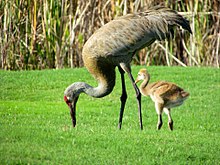Sandhill Crane
| Sandhill crane | |
|---|---|
 |
|
| Adult and chick | |
| Scientific classification | |
| Kingdom: | Animalia |
| Phylum: | Chordata |
| Subphylum: | Vertebrata |
| Class: | Aves |
| Order: | Gruiformes |
| Family: | Gruidae |
| Genus: | Grus |
| Species: | G. canadensis |
| Binomial name | |
|
Grus canadensis (Linnaeus, 1758) |
|
| subspecies | |
and see text |
|
| Synonyms | |
|
Ardea canadensis Linnaeus, 1758 |
|
and see text
Ardea canadensis Linnaeus, 1758
Grus minor
Grus proavus
and see text
The sandhill crane (Grus canadensis) is a species of large crane of North America and extreme northeastern Siberia. The common name of this bird refers to habitat like that at the Platte River, on the edge of Nebraska's Sandhills on the American Plains. This is the most important stopover area for the nominotypical subspecies, the lesser sandhill crane (Grus canadensis canadensis), with up to 450,000 of these birds migrating through annually.
The scientific name is from Latin; grus is "crane", and canadensis is "Canadian".
Adults are gray overall; during breeding, their plumage is usually much worn and stained, particularly in the migratory populations, and looks nearly ochre. The average weight of the larger males is 4.57 kg (10.1 lb), while the average weight of females is 4.02 kg (8.9 lb), with a range of 2.7 to 6.7 kg (6.0 to 14.8 lb) across the subspecies. Sandhill cranes have red foreheads, white cheeks, and long, dark, pointed bills. In flight, their long, dark legs trail behind, and their long necks keep straight. Immature birds have reddish-brown upperparts and gray underparts. The sexes look alike. Sizes vary among the different subspecies; the average height of these birds is around 80 to 122 cm (2 ft 7 in to 4 ft 0 in). Their wing chords are typically 41.8–60 cm (16.5–23.6 in), tails are 10–26.4 cm (3.9–10.4 in), the exposed culmens are 6.9–16 cm (2.7–6.3 in) long, and the tarsi measure 15.5–26.6 cm (6.1–10.5 in).
...
Wikipedia

